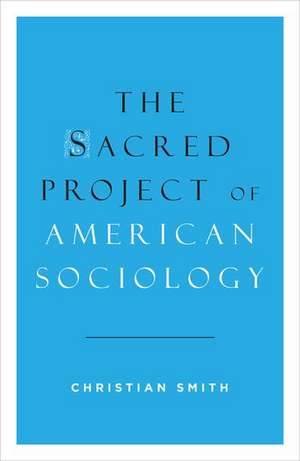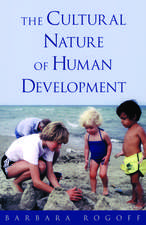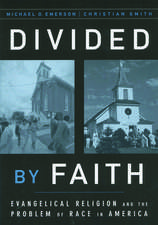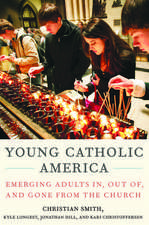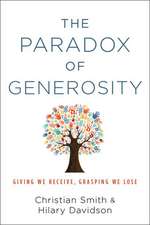The Sacred Project of American Sociology
Autor Christian Smithen Limba Engleză Hardback – 21 aug 2014
Preț: 255.12 lei
Preț vechi: 297.02 lei
-14% Nou
Puncte Express: 383
Preț estimativ în valută:
48.82€ • 50.78$ • 40.31£
48.82€ • 50.78$ • 40.31£
Carte tipărită la comandă
Livrare economică 04-10 aprilie
Preluare comenzi: 021 569.72.76
Specificații
ISBN-13: 9780199377138
ISBN-10: 0199377138
Pagini: 224
Dimensiuni: 145 x 211 x 25 mm
Greutate: 0.34 kg
Editura: Oxford University Press
Colecția OUP USA
Locul publicării:New York, United States
ISBN-10: 0199377138
Pagini: 224
Dimensiuni: 145 x 211 x 25 mm
Greutate: 0.34 kg
Editura: Oxford University Press
Colecția OUP USA
Locul publicării:New York, United States
Recenzii
[A] slim, masterful volume.
What, one might ask, could possess a well-established and well-known sociologist to write an account of his discipline as a sacred project while at the same time exposing its close-minded outlook? The answer Christian Smith provides is both bracing and sad, bracing in its thoroughness and originality, and sad in the very necessity to shine such a light on a discipline that is largely blind to the unintended consequences of its lopsided claims about the nature of social reality. Smith's observations are a carefully assembled, empirical confirmation that sociology still has important insights and ideas to convey to both students and the public, but that it has failed decisively in its efforts to account for life beyond the very narrow confines of its own expectations about what is right and wrong with that life.
Christian Smith has developed a fresh and creative perspective on contemporary American sociology as a sacred project. His arguments are bold and provocative. Smith has begun a discussion that is vitally important for the present and future of the discipline, and his efforts deserve a wide and attentive audience.
Emancipation, autonomy, affirmation!' That is the revolutionary creed of American sociology, or so Christian Smith argues in the most unflinching look at the discipline since Alvin Gouldner. By excavating the moral unconscious of the sociological project, Smith prompts us to ask whether these should be our sole and highest values and whether they are not at odds with one another in profound and unexamined ways.
Smith's book should be read not just by his fellow sociologists but by anyone who is concerned about the current state of higher education. ...it will, hopefully, cause a dust-up beyond the sociology departments of the nation's campuses.
Sociologists want to present themselves as objective scientists of the social order, but when Christian Smith looks at his disciple he doesn't see science. He sees the Sacred Project of American Sociology, sociology constituted as a project that he is even willing to describe as spiritual. He applies a "sociology of religion" to the discipline of American sociology itself. Smith concludes that there is no obvious way to hold sociology accountable. Perhaps this courageous, hard-hitting book might stir the pot just enough to get sociologists to take another look at their totems.
What, one might ask, could possess a well-established and well-known sociologist to write an account of his discipline as a sacred project while at the same time exposing its close-minded outlook? The answer Christian Smith provides is both bracing and sad, bracing in its thoroughness and originality, and sad in the very necessity to shine such a light on a discipline that is largely blind to the unintended consequences of its lopsided claims about the nature of social reality. Smith's observations are a carefully assembled, empirical confirmation that sociology still has important insights and ideas to convey to both students and the public, but that it has failed decisively in its efforts to account for life beyond the very narrow confines of its own expectations about what is right and wrong with that life.
Christian Smith has developed a fresh and creative perspective on contemporary American sociology as a sacred project. His arguments are bold and provocative. Smith has begun a discussion that is vitally important for the present and future of the discipline, and his efforts deserve a wide and attentive audience.
Emancipation, autonomy, affirmation!' That is the revolutionary creed of American sociology, or so Christian Smith argues in the most unflinching look at the discipline since Alvin Gouldner. By excavating the moral unconscious of the sociological project, Smith prompts us to ask whether these should be our sole and highest values and whether they are not at odds with one another in profound and unexamined ways.
Smith's book should be read not just by his fellow sociologists but by anyone who is concerned about the current state of higher education. ...it will, hopefully, cause a dust-up beyond the sociology departments of the nation's campuses.
Sociologists want to present themselves as objective scientists of the social order, but when Christian Smith looks at his disciple he doesn't see science. He sees the Sacred Project of American Sociology, sociology constituted as a project that he is even willing to describe as spiritual. He applies a "sociology of religion" to the discipline of American sociology itself. Smith concludes that there is no obvious way to hold sociology accountable. Perhaps this courageous, hard-hitting book might stir the pot just enough to get sociologists to take another look at their totems.
Notă biografică
Christian Smith is the William R. Kenan, Jr. Professor of Sociology at the University of Notre Dame, Director of the Center for the Study of Religion and Society, Director of the Notre Dame Center for Social Research, Principal Investigator of the National Study of Youth and Religion, and Principal Investigator of the Science of Generosity Initiative.
